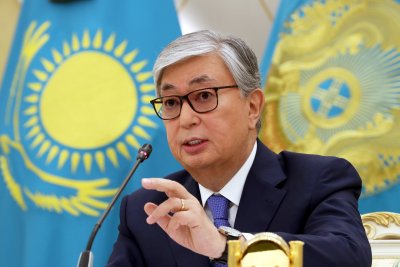Topic: Islam Karimov
Quotes
I would like to especially speak on one issue. Uzbekistan counts on Russia's well thought-out and considered position on issues relating to the implementation of hydropower projects in the Central Asian region
Russia wades into Central Asian water dispute Jan 30, 2009
We will examine the circle of pressing timely issues that we see and observe, on which we have our own views and which we are ready not only to discuss together, but honestly to express our own position on those issues
Russia scores Uzbek natural gas Sep 05, 2008
It is easy to see that they would like to see conflicts from which they would gain a certain advantage. ... In its foreign policy, Uzbekistan has always stood for mutual respect and mutually advantageous cooperation with all close and remote countries, including the United States and European nations
Outside View: Uzbek-U.S. relations warming Jan 30, 2008
We've appraised the existing level of economic cooperation as something wholly unsatisfactory and outlined ways of ensuring a dynamic growth of the trade turnover
Analysis: Uzbek-Turkmen cooperation Oct 19, 2007
This is an important step for energy co-operation between the two countries
China and Uzbekistan sign $600m oil deal May 26, 2005
Islam Abdug‘aniyevich Karimov (Cyrillic Uzbek: Ислом Абдуғаниевич Каримов; Russian: Ислам Абдуганиевич Каримов Islam Abduganiyevich Karimov) (born January 30, 1938) is an Uzbek politician who has been the first President of Uzbekistan since 1990.
Karimov was born in an orphanage in Samarkand, growing up to study economics and engineering at university. He became an official in the Communist Party of the Soviet Union, becoming the party's First Secretary in Uzbekistan in 1989. On March 24, 1990 he became President of the Uzbek Soviet Socialist Republic. Karimov's election to the Uzbek Communist Party resulted after his predecessor Rafik Nishanov failed to quell inter-ethnic clashes and instability in the Fergana region. He declared Uzbekistan an independent nation on August 31, 1991 and subsequently won Uzbekistan's first presidential election on December 29, 1991, with 86% of the vote. The election was called unfair, with state-run propaganda and a falsified vote count, although the opposing candidate and leader of the Erk (Freedom) Party, Muhammad Salih, had a chance to participate. Karimov permitted the participation of the opposition organizations Birlik (Uzbekistan) ("popular movement") and the Islamic Renaissance Party until his efforts to consolidate power over Shukrullo Mirsaidov, a former Communist Party elite who had originally supported Karimov's rise to the Party presidency. The period of political thaw was brief; Karimov began to complicate the registration process of opposition parties during elections. As Birlik grew in strength as a "popular movement", it was denied the ability to register as a "political party" without the required 60,000 signatures. The Karimov government allowed Birlik one day to gather these signatures, 25,000 of which they rejected. Karimov effectively took authoritarian measures to block any meaningful opposition.
Uzbekistan under the Karimov government classifies as a hard authoritarian regime with little to no civil society promotion. The state's primary legitimacy claims are anti-Islamism and ethnic identity. Karimov's primary authoritarian measures that were implemented following the brief period of "thaw" and political tolerance include the thwarting of alternative politica leaders from coalition building.
It uses material from the Wikipedia article "Islam Karimov."













